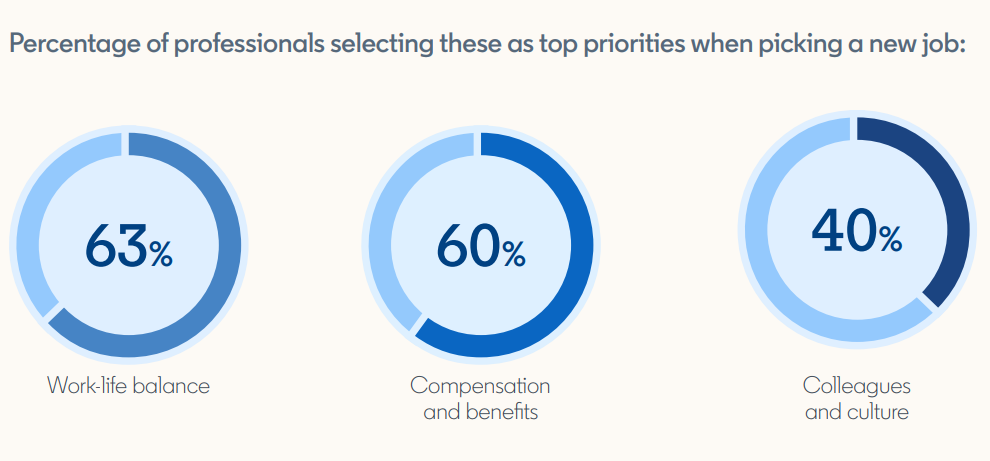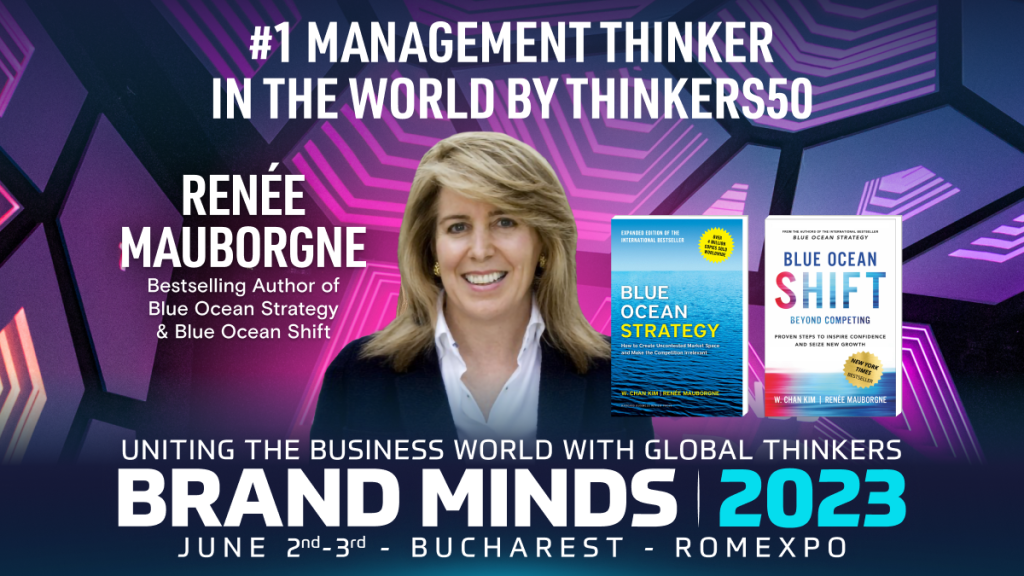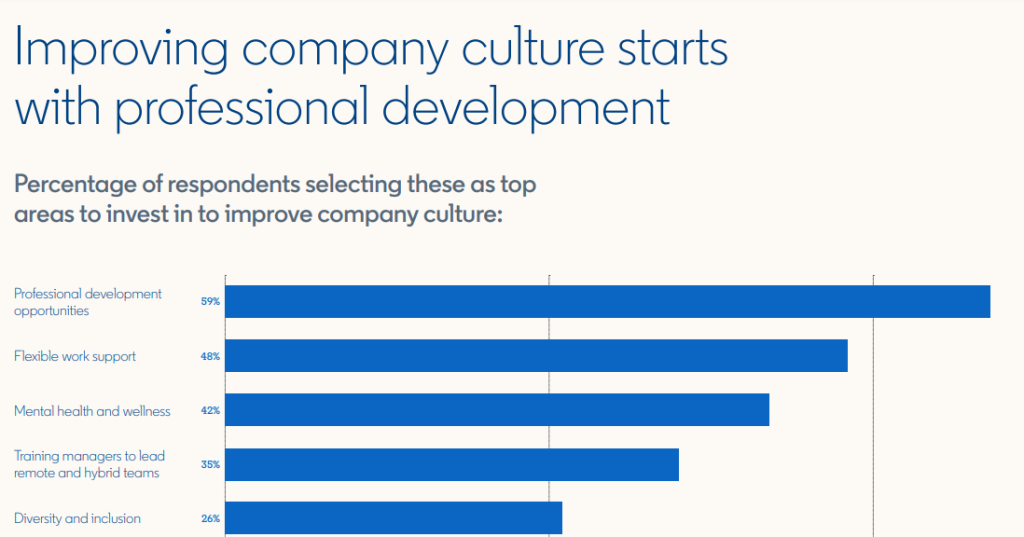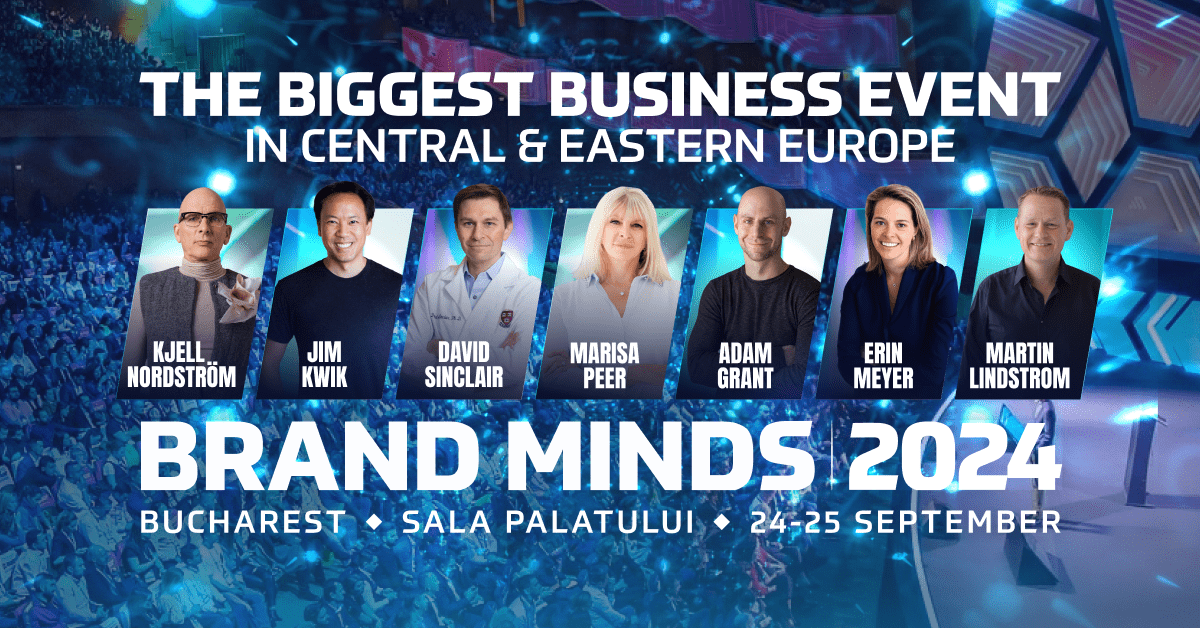Updated September 2022
Looking for strategies to future-proof your business? You’ve come to the right place!
7 strategies to future-proof your business
- Become customer-focused
- Empower your employees
- Ship early and iterate often
- Ask What if questions
- Be agile, avoid silos
- Improve your company culture to combat resignation & quiet quitting
- Always be looking for blue oceans
1. Become customer-focused
Many businesses say they are customer-focused, but they are really not. Being customer-focused means a lot more than having a sheet with your buyer persona; it means your business has processes in place to facilitate ongoing and active communication with your customer base.
Amazon is one of the best examples of customer-focused companies. In his now-famous letters to shareholders, former Amazon CEO Jeff Bezos made it very clear that the business principle upon which he built his company was to focus on customers.
Once your company is focused on customers, you can take the next step: delight your customers.
In his 2016 letter, Jeff says “customers are always beautifully, wonderfully dissatisfied, even when they report being happy and business is great”.
In his 2018 letter, he defines them as “divinely discontent”. Achieving the goal of delighting customers means developing a powerful system built on true customer obsession.
What benefits does your company have by going laser-focused on its customers? There are many.
Here is the Amazon customer-focused trifecta:
- Listen to your customers and use this data to offer them something they simply could not get any other way;
- Improving the shopping experience never ends so pursue it with tenacity and persistence;
- Invent on behalf of your customers. Your customers will always want something better and it’s up to you to figure out what exactly it is they expect because, and here’s your challenge, they don’t know what to ask for.
“We must invent on their behalf. We have to tap into our own inner imagination about what’s possible.”
That’s how AWS, one of Amazon’s most successful services came to be. No customer specifically asked for it and yet that’s what they needed.
In 2021, AWS generated 74% of Amazon’s operating profit (up from 59% in 2020) with $469.8 in revenue (source).
2. Empower employees to contribute
BRAND MINDS 2020 speaker Simon Sinek says that if the company takes care of its employees, they will take care of the company.
What does that mean? It means the employees are in the safety zone, the zone where the leader protects his team from threats coming from inside the organisation.
When there are no layoff threats looming over them or workplace rivalries they need to fight and survive, employees are more prepared to protect the company from outside threats. The employees are willing to share information and cooperate naturally towards growing the business.
When the company doesn’t provide a safety zone for its people, various case studies of prominent companies showed that it gives rise to negative feelings like paranoia, cynicism, and employees with personal agendas. In short: a dog-eat-dog kind of culture where arrogance, inflating egos and fear make the rules.
That was the case with Nokia. At one time, Nokia was the smartphone market leader. Three years after the launch of Apple’s iPhone, the market value of Nokia declined by about 90% and was acquired by Microsoft in 2013.
Why did Nokia fail? Organisational fear.
A very interesting report showed that the organisational fear was grounded in a culture of temperamental leaders and frightened middle managers.
In short, Nokia’s people weakened Nokia and thus made the company increasingly vulnerable to competitive forces.
Looking to build high-performing teams?
Learn from Future of Work Strategy Expert @London Business School Lynda Gratton live, on stage, at BRAND MINDS 2023!

3. Ship early and iterate often
If you are a startup developing a new platform or an innovative product, you want your end product to be amazing. You want to awe your customers. You want your product to be perfect. It’s a very dangerous temptation and you must resist it! No product is perfect and if you wait too long, you might ship it too late.
Ship your product as MVP (minimum viable product) and iterate as often as you need. The advantage of shipping early is that you have an incredible opportunity to build a community around your product and even enlist their help in improving your product.
Invite your early adopters (who will become your first customers) to contribute to the development of your product. Ask them what new features they think would improve your product or how they would change it to serve their needs better. You might uncover solutions that your team didn’t think of. Or be inspired to set on a different path altogether effectively changing your future.
Keep your first customers close and turn them into ambassadors so they can attract new customers.
4. Ask What if questions
Asking What if questions is a great exercise every leader should do with their team at least once a year.
What if our main supplier goes bankrupt or cannot deliver for five months in a row?
What if a stronger competitor enters the market?
What if there’s a highly contagious virus outbreak that turns into a pandemic? Although I doubt anyone in the business world has ever asked this particular question, imagining a different present can protect your business’s future.
- Look closely at the technology trends in your market
- Notice the behaviour changes of your customers
- Dial up or dial down one area of your business and anticipate the consequences. Are you prepared to deal with these consequences? If you are, congratulations! If you’re not, start writing a new business strategy today.
- Turn the threats into opportunities. Develop various scenarios of how the future might unfold and challenge current assumptions and known truths.
Asking “what if” questions is essential to identify possible implications if scenarios come to life:
What are the threats and opportunities in this scenario?
What actions shall we take to reduce vulnerabilities?
What actions shall we take to build on the opportunities?
What elements/data do we need to watch out for so we know when to take action?
Learn more about scenario planning and foresight under uncertainty.
5. Be agile, avoid silos
Times are changing quickly and the business environment must adapt and keep up without delay. To achieve this goal, stop looking at your organisation as a machine. Start looking at it as a living organism.
Much like a living organism, your business must find solutions to challenges and redirect resources wherever they are needed.
Organisational agility gives your business the competitive edge it needs in a digital world.
Agile companies are better equipped to deal with disruptions. They achieve greater customer centricity than their competitors. They are faster to market, with higher revenue growth at lower costs.
Agile organisations have a more engaged workforce and better alignment between product management and R&D. Agility enables companies to innovate faster with less risk and meet actual business requirements. Organisations with agile teams can rapidly and easily incorporate new technologies.
6. Improve your company culture to combat resignation & quiet quitting
In its 2022 Global Trends Report, LinkedIn found significant changes in the priorities set by professionals looking for a new job with flexibility being the most important.
Companies that view the situation as being not a disruption, but an opportunity will be five steps ahead of their competition. The motto of this year for hiring managers is Adapt to thrive.

Now that your company has hired the right professionals, the next step is to provide them with the right environment to produce good work.
And that’s when company culture comes into play.
Labor shortages have disrupted entire industries on a global scale these past two years. The Great Resignation is not over yet with millions of workers still quitting their jobs and asking for more from hiring companies.
A new situation has emerged this year: quiet quitting. Quiet quitting is a term used to illustrate decreasing rates of employee engagement.
What is quiet quitting?
It’s a state of mind where the employee is doing their job but they are not coming up with new ideas for the project they are working on and they lack initiative, creativity and enthusiasm for the company’s mission. They just don’t care anymore.
Team leaders should be the first to notice. In companies with the right culture, this shouldn’t happen. And it should also be noted that quiet quitting is a strong indicator of employees thinking about leaving in the near future.
When this happens, the solution is to improve the company culture.
When asked about the most important area top management should invest in to keep employees engaged, 59% of respondents indicated professional development opportunities.
This goes to show that professionals have changed their intent regarding the jobs they do. They are looking for companies where they can grow and develop as professionals in their industry.
It’s every company’s top management’s responsibility to build a culture where employees are provided with professional development opportunities, advance in their careers and live their best life.
7. Always be looking for blue oceans
The Blue Ocean Strategy was created by INSEAD Professors of Strategy Reneé Mauborgne and Chan Kim and detailed in their bestseller by the same name.
Blue Ocean Strategy has sold over 4 million copies and is recognized as one of the most iconic and impactful strategy books ever written. The book shows the results of a study of 150 strategic moves spanning more than 100 years across 30 industries.
The authors’ conclusion is that lasting success comes not from battling competitors but from creating blue oceans – untapped new market spaces ripe for growth.
What is the blue ocean strategy?
The Blue ocean is the metaphor for the unknown market space and all the industries that are not in existence today. It’s the unchartered land that courageous explorers venture in to discover unimaginable riches and opportunities.
The blue ocean concept is the result of thirty-year research conducted by Renée and Chan in which they studied organizations large and small, for-profit and non-profit and even governments.
What they looked at was how these organizations moved beyond competing in existing crowded markets—what we think of as red oceans—to new heights of confidence, market creation and growth.
In the blue ocean strategy, the organizations focus on creating new demand, turning non-customers into customers and unlocking unrealized talent and energy within themselves fast and at low cost.
























